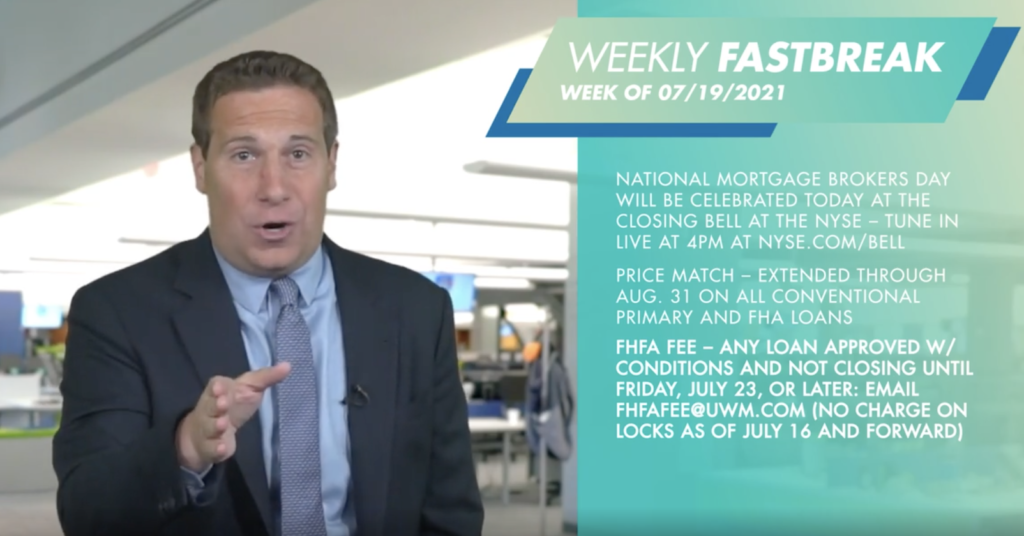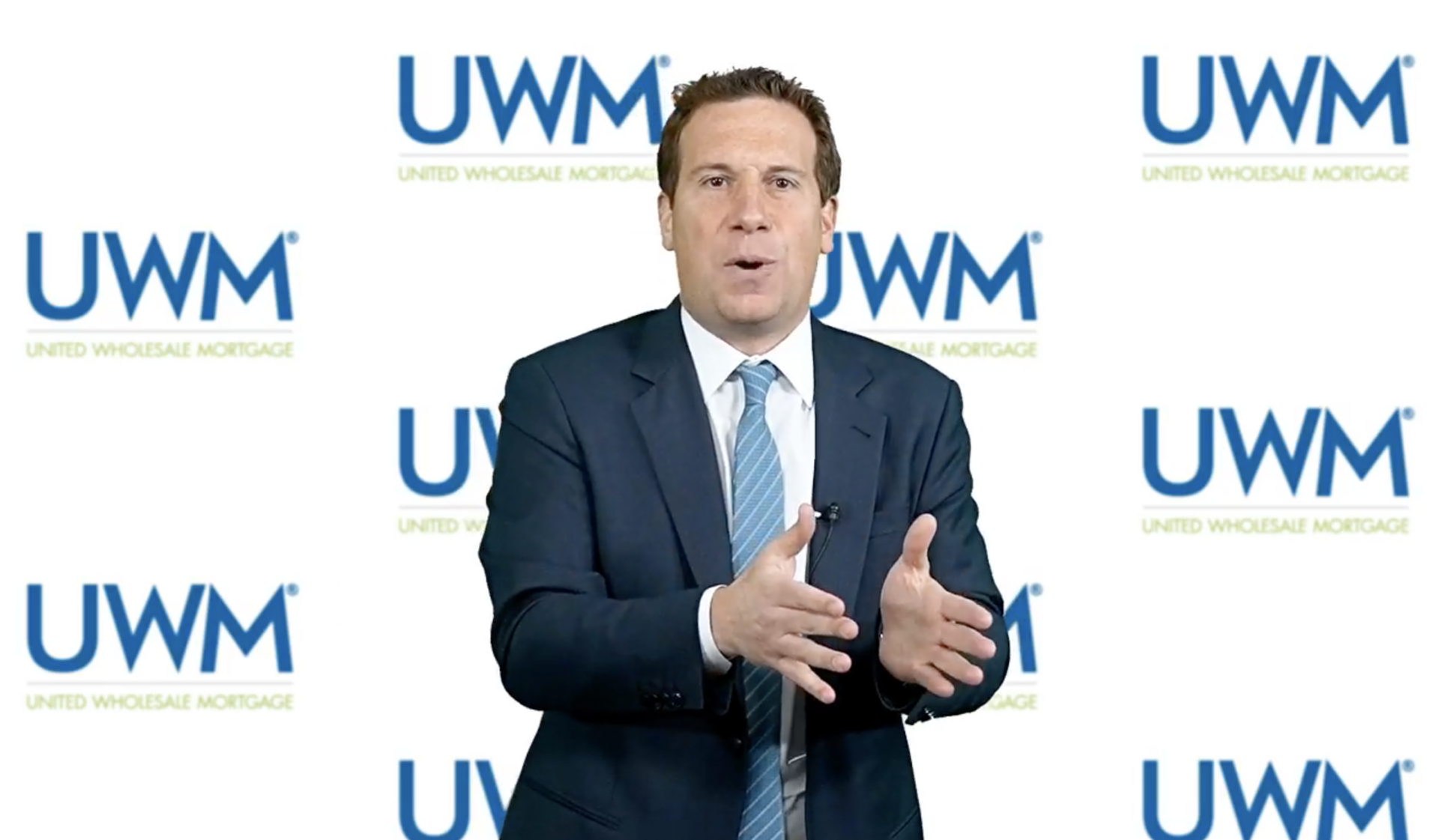Mat Ishbia appears to be the odd man out when it comes to handling fees from customers the feds are no longer collecting.
On July 16, the Federal Housing Finance Agency (FHFA) announced it was ending the adverse market refinancing fee for loan deliveries effective August 1, 2021. The fee, designed to address risk from anticipated losses due to COVID-19, was always unpopular. Proposed by the Trump administration last summer, it was repeatedly delayed before going into effect in December.
It was welcome news to the entire industry — data show a surge in mortgage applications in the week after the 50 basis point fee was lifted — but it may have been exceptionally good news for United Wholesale Mortgage (UWM) and its CEO Ishbia. While the other major players in the mortgage market immediately dropped the fee from loans in their lending pipeline, including “locked” loans, Ishbia took a different approach.
The company said in a July 16 email it was going to lift the fee from “any loan locked today,” rather than any loans that wouldn’t go to the FHFA until after August 1. When questions were raised about the loans in their pipeline, Ishbia released a video explaining UWM’s new approach.
“So here’s what the deal is: Any loan that’s approved today, July 21st or after, that is not closing until July 23rd, you won’t get charged the FHFA fee,” he explained. “All you’ve got to do is email [email protected] and put the name and loan number in the subject line and say, ‘please remove this for my consumers,’ email us. We’ll think of the day or two to do it.”
Acknowledging it’s “sort of a manual process,” Ishbia said he didn’t want to pull his IT people away from “some big things coming” for UWM in order to solve the fee problem.
“If your consumer really needs it, and you’re holding that closing until at least Friday of this week, we know we won’t get charged. So therefore, I don’t want to charge the consumer. It’s that easy,” Ishbia said.

Critics, however, say UWM’s approach is far from easy. Asking customers to request the return of their FHFA fee is “offensive,” said Austin Niemiec, EVP of Rocket Pro TPO.
“We made the decision within hours of the announcement of exactly and specifically how we were going to handle it,” Niemiec said of the FHFA’s move. “We instantly removed the fee for floating loans. And then we gave the commitment to the broker community that were moving the fee from all locked loans that weren’t at closing yet.”
In his video Ishbia also explained that UWM faced another challenge when trying to refund the fee to brokers because the company closes loans “so fast”. That’s questionable according to some industry experts who said that UWM would be able to keep the closed loans using their warehouse lines of credit then sell the loan to the FHFA after the adverse market fee was removed – a move that other lenders did.
Forcing brokers to email and ask for their customers’ money back is “an insult to the broker community,” Niemiec said.
It also may be at odds with the intentions of the FHFA.
In a statement to The Mortgage Note, Adam Russell of FHFA’s Office of Congressional Affairs and Communications said, “FHFA’s expectation is that those lenders who were charging borrowers the fee will pass cost savings back to borrowers.”
Russell also referenced an FHFA press release quoting Acting Director Sandra L. Thompson. “Eliminating the Adverse Market Refinance Fee will help families take advantage of the low-rate environment to save more money, [furthering] FHFA’s priority of supporting affordable housing.”
UWM did not respond to The Mortgage Note’s request for comment.
It’s not surprising that Niemiec, whose company’s rivalry with UWM is one of the industry’s biggest stories, would criticize Ishbia Niemiec argues, however, there’s a bigger issue here: treatment of consumers.
“In the video [Ishbia] says ‘If your consumers really need it.’ If? What does that mean — that if a broker decides the consumer doesn’t need the money, they should just keep it? That’s a terrible message,” Niemiec said.
“And he said another reason he couldn’t get the fee off the loans for all those families was because he didn’t want to prioritize the technology. So instead UWM collects the fees and keeps millions of dollars from customers because they don’t want to ‘prioritize the technology.’”
The battle between Rocket and UWM has gotten more bitter since March when Ishbia issued an ultimatum to mortgage brokers that if they did business with Rocket, UWM would no longer do business with them.
“The reality is, brokers are all in,” Ishbia told CNBC at the time. “They understand that Mat and UWM [are] here to protect the broker channel and consumers because consumers get lower rates when they go through a broker.My business is not designed to make my competitors like me.”
Niemiec notes that UWM’s ultimatum meant brokers who in the past could have taken a loan to Rocket to avoid the 50 basis points fee lost that option. Multiply that by hundreds of closings and that’s real money.
“Money that doesn’t go to the broker,” Niemiec added. “That money goes straight to the company, and Mat Ishbia owns the company.”
“The saddest part about this whole thing is for the brokers who said, ‘fine, you’re not going to refund the 50 basis points to my borrower. I’ll move this loan to Rocket,’ because if they did, Mat Ishbia would charge them up to $50,000 if they work with both of us.
“Through this ultimatum, he’s holding these brokers hostage,” Niemiec said.
UWM stands by its policy of requiring requests for refunds rather than proactively returning uncharged fees to consumers. It’s not a popular position among consumer advocates.
Center for Responsible Lending Senior Policy Counsel Melissa Stegman told The Mortgage Note in a statement the adverse market fee “is especially harmful for our nation’s low- and moderate-income homeowners in a time when refinancing can help them weather the turbulent economy.
“Lenders must remove the fee unilaterally and not put the burden on borrowers to request it, for the well-being of homeowners and the health of our housing market,” Stegman said.
